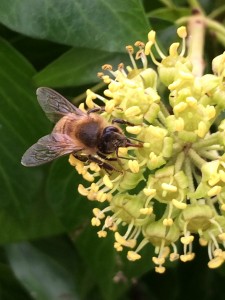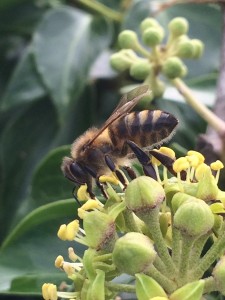26 Sep Ivy Flow coming on strong
Today there has been a surge in nectar flow from the ivy with our bees putting on the afterburner to build up stores for the Winter.
Walking amongst the hives one is hit by the pungent scent of ivy honey being laid down in the combs and the noise of bees buzzing away outside and inside the hives is remarkable – almost like a chainsaw.
The busy hive entrances show our bees arriving heavily laden with the bright yellow pollen of the ivy and those carrying nectar often colliding drunkenly with other queuing bees. There is also some beige coloured pollen coming in as our autumn heather continues to blossom, but the main foraging now is on the ivy.
This short video, part of which is slo mo, shows some of the action today.
A number of bees are posted around the reduced entrance with their tails in the air, fanning away with their wings to provide incoming bees with a vapour trail of pheromones to allow them to home-in on the front door.
The entrances have been reduced for two reasons:
1. To try and stop “robbing”. Robbing occurs when bees from a stronger hive invade the weaker hives to steal their honey stores. It can escalate rapidly, especially during times of poor nectar flow ( as happened the last wet week of August) becoming a full-on conflict within minutes resulting in the annihilation of the weaker colony. The end result is often a mound of dead bees seen at the entrance and a completely empty hive. We have had a couple of instances this Autumn, losing one colony but managing to stop the other “attack” by closing all the hives’ entrances right down. This makes it easier for the hive occupants to defend their hive – not only from neighbouring bees, but also wasps which are also increasingly aggressive and prevalent this time of year.
2. Mice! As the nights get colder with Autumn, field mice sometimes manage to squeeze in to the warm brood nest and make it their winter home. This can be surprisingly destructive to the brood nest and colony. All of my entrances now have their entrances equipped with mouse guards of some sort.
This next few weeks will be important for our bees as it is their last chance to take a significant haul for winter stores. The pollen will be vital “brood food” for developing bees and the nectar is being turned into honey stores for the grown-ups.
Here are some pics taken today of a bee working the nectar on the ivy flower, its tongue probing away
Double click on the images to see some detail:



